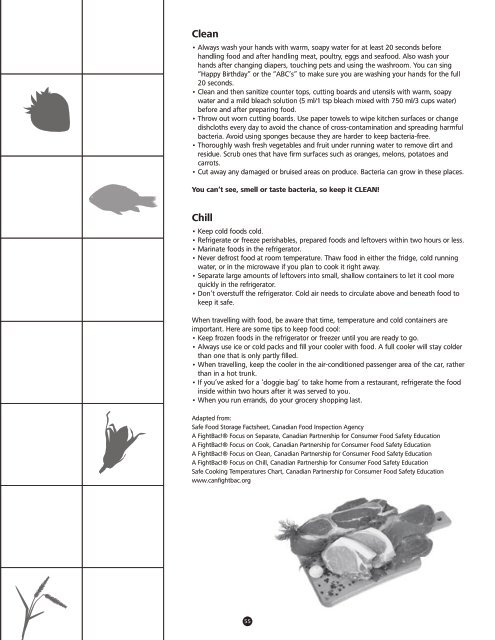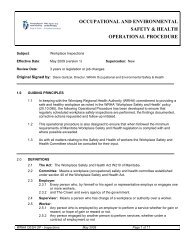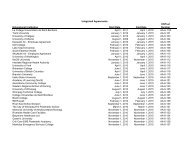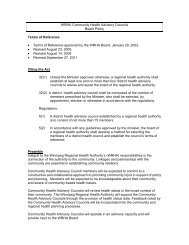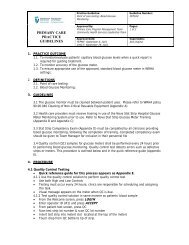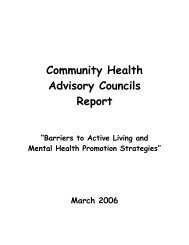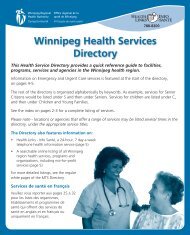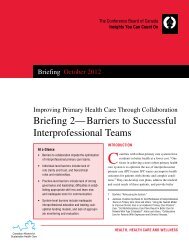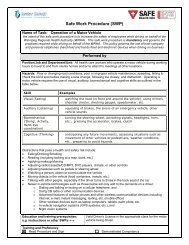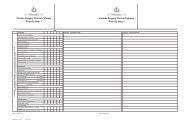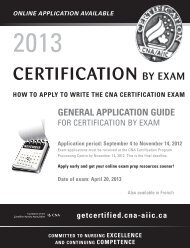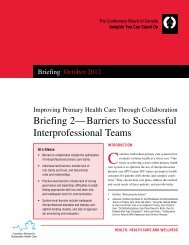Four Weeks of Healthy Menus - Winnipeg Regional Health Authority
Four Weeks of Healthy Menus - Winnipeg Regional Health Authority
Four Weeks of Healthy Menus - Winnipeg Regional Health Authority
You also want an ePaper? Increase the reach of your titles
YUMPU automatically turns print PDFs into web optimized ePapers that Google loves.
Clean• Always wash your hands with warm, soapy water for at least 20 seconds beforehandling food and after handling meat, poultry, eggs and seafood. Also wash yourhands after changing diapers, touching pets and using the washroom. You can sing“Happy Birthday” or the “ABC’s” to make sure you are washing your hands for the full20 seconds.• Clean and then sanitize counter tops, cutting boards and utensils with warm, soapywater and a mild bleach solution (5 ml/1 tsp bleach mixed with 750 ml/3 cups water)before and after preparing food.• Throw out worn cutting boards. Use paper towels to wipe kitchen surfaces or changedishcloths every day to avoid the chance <strong>of</strong> cross-contamination and spreading harmfulbacteria. Avoid using sponges because they are harder to keep bacteria-free.• Thoroughly wash fresh vegetables and fruit under running water to remove dirt andresidue. Scrub ones that have firm surfaces such as oranges, melons, potatoes andcarrots.• Cut away any damaged or bruised areas on produce. Bacteria can grow in these places.You can’t see, smell or taste bacteria, so keep it CLEAN!Chill• Keep cold foods cold.• Refrigerate or freeze perishables, prepared foods and leftovers within two hours or less.• Marinate foods in the refrigerator.• Never defrost food at room temperature. Thaw food in either the fridge, cold runningwater, or in the microwave if you plan to cook it right away.• Separate large amounts <strong>of</strong> leftovers into small, shallow containers to let it cool morequickly in the refrigerator.• Don’t overstuff the refrigerator. Cold air needs to circulate above and beneath food tokeep it safe.When travelling with food, be aware that time, temperature and cold containers areimportant. Here are some tips to keep food cool:• Keep frozen foods in the refrigerator or freezer until you are ready to go.• Always use ice or cold packs and fill your cooler with food. A full cooler will stay colderthan one that is only partly filled.• When travelling, keep the cooler in the air-conditioned passenger area <strong>of</strong> the car, ratherthan in a hot trunk.• If you’ve asked for a ‘doggie bag’ to take home from a restaurant, refrigerate the foodinside within two hours after it was served to you.• When you run errands, do your grocery shopping last.Adapted from:Safe Food Storage Factsheet, Canadian Food Inspection AgencyA FightBac!® Focus on Separate, Canadian Partnership for Consumer Food Safety EducationA FightBac!® Focus on Cook, Canadian Partnership for Consumer Food Safety EducationA FightBac!® Focus on Clean, Canadian Partnership for Consumer Food Safety EducationA FightBac!® Focus on Chill, Canadian Partnership for Consumer Food Safety EducationSafe Cooking Temperatures Chart, Canadian Partnership for Consumer Food Safety Educationwww.canfightbac.org55


